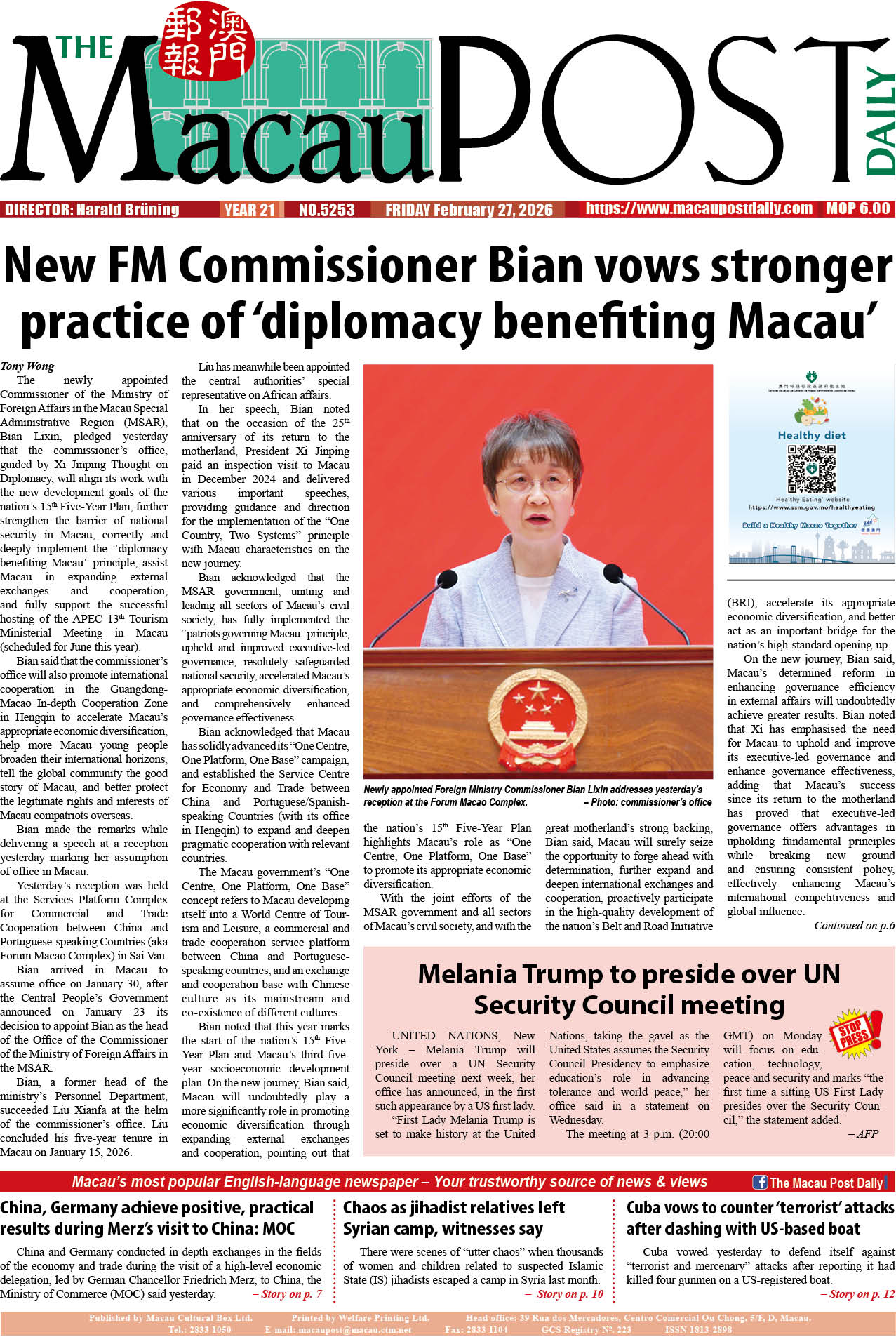Secretary for Security Wong Sio Chak says that eligible border crossers will be able to pass border controls at the Macau-mainland joint checkpoint on Zhuhai’s Hengqin island without having to present travel documents when using e-channels where they will only have to pass fingerprint scans and facial recognition, adding that the new measure is expected to get off the ground in October.
Wong made the remarks during a one-day Q&A session in the Legislative Assembly’s (AL) hemicycle on Friday about his portfolio’s policy guidelines for this year.
Since November 20 last year, eligible border crossers have been able to pass e-channels at Zhuhai’s Gongbei checkpoint without having to present travel documents where they are only required to pass fingerprint scans and facial recognition. The Gongbei checkpoint is currently the only mainland-Macau border checkpoint where this measure is implemented.
While the Hengqin checkpoint is a Macau-mainland joint checkpoint where border crossers are required to pass border controls only once, Gongbei is not a joint checkpoint, with its counterpart at the Macau side being the Barrier Gate checkpoint.
After border crossers en route to the mainland complete their departure formalities at Macau’s Barrier Gate checkpoint, they are required to pass through an “in-between area” before entering Zhuhai’s Gongbei checkpoint where they need to complete their arrival formalities.
Currently, three of Macau’s land border checkpoints with Zhuhai are Macau-mainland joint checkpoints, where the “joint inspection and one-time release” system is operating, namely the Macau-Zhuhai checkpoint of the Hong Kong-Zhuhai-Macau Bridge (HZMB), the Hengqin checkpoint, and the Qingmao pedestrian border checkpoint.
The “joint inspection and one-time release” model is a joint Macau-mainland immigration clearance system adopted at Macau-mainland joint checkpoints where border crossers are required to pass border controls only once when completing their departure and arrival formalities.
Currently, when using the three Macau-mainland joint checkpoints’ e-channels, border crossers are required to have their travel documents scanned first, after which they are required to pass fingerprint scans and facial recognition.
During Friday’s Q&A session, Wong said that 46 additional e-channels will be installed at the Hengqin checkpoint later this year, all of which will be equipped with the function enabling border crossers to pass border controls without having to present travel documents where they will only have to pass fingerprint scans and facial recognition. In addition, Wong said, all existing e-channels at the Hengqin checkpoint will be upgraded to also include the function later this year.
Wong added that tests are scheduled to be carried out for the newly installed and newly upgraded e-channels from July, before the newly installed e-channels with the new function are expected to start operating in October when the new function is also expected to become available at the newly upgraded e-channels.
Wong pointed out that both the Hengqin checkpoint and the Qingmao checkpoint are Macau-mainland joint checkpoints where the “joint inspection and one-time release” system is operating. Consequently, he said, after the successful implementation of the new function at the Hengqin checkpoint, Macau’s immigration authorities and their mainland counterparts will jointly study the feasibility of also adopting the new function at the Qingmao checkpoint.
Phone & online fraud victims lose 232 million patacas last year
Meanwhile, Wong also underlined during Friday’s Q&A session that alongside senior citizens, university students are another major segment of victims of telecom frauds.
Wong said that the total financial loss resulting from phone and online fraud cases reported in Macau last year amounted to 232 million patacas last year, a decrease from the 310 million patacas in 2023. He also said that the victims of phone and online fraud cases reported in Hong Kong and Singapore last year suffered financial losses equivalent to 9.4 billion patacas and 6.7 billion patacas in total respectively.
Wong also said that the phenomenon where many well-educated people who have been aware of the police forces’ fraud prevention information are still being defrauded is worth studying.
Meanwhile, Wong also said that the new law criminalising illegal currency exchanges, which took effect in late October last year, has been very effective in bringing down such activities.
Wong also said that the local government will study the feasibility of amending the organisational structure of its Committee for Safeguarding National Security with the aim of expanding the scopes and aspects in the local government as well as in civil society to be covered by the safeguarding of national security.

Secretary for Security Wong Sio Chak addresses Friday’s Q&A session about his portfolio’s 2025 policy guidelines in the Legislative Assembly’s (AL) hemicycle. – Photo courtesy of TDM








